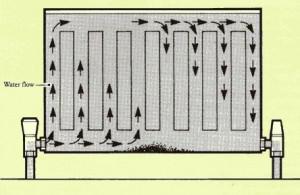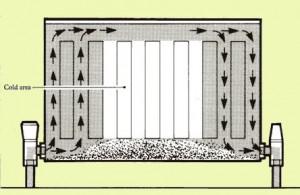 Causes, especially in the central heating systems, installation, mud, wave radiators and piping corrosion as a result of contamination by particles from the inner surface termination as a result of improper installation of radiators and central parts of the work over time.
Causes, especially in the central heating systems, installation, mud, wave radiators and piping corrosion as a result of contamination by particles from the inner surface termination as a result of improper installation of radiators and central parts of the work over time.
Hot water inlet and outlet, as shown in the bottom cold water is located in the central part of the radiator accumulated as a result of these particles in this section prevents the circulation of the water. As a result, parts of cold water will not remain in circulation. Particles accumulated in this section, the effect of temperature and pressure over time and harden before taşlaşırlar time. The downside, as long as it continues to accumulate in piles on. Figure 2 also clearly observed that the formation of the accumulation over time.

Looking at the arrows show the path of the water is as follows;
1 – the left side of the radiator heats the hot water, but the 1-2 zone.
2 – Middle slices are accumulated and hardened mud just below the shaft and so on. The hot water can circulate is not in this section.
3 – however, you find a passage from the upper part of the middle slices of hot water quickly to the back of the segments is attacked.
4 – The last 1-2 zone, the hot water circulation in the radiator heats up is complete.
To avoid this negative situation, primarily applied in the correct connection. Be connected back to the top and bottom must be with a hot water heater. Also, the compounds produced in this way is not true.
Because that’s part of the connections on the other end of the radiator and heater problems adds up and can be viewed as negative.
The ideal cross-link to form a connection. This is the entrance to the hot water from the top, cold water, turn water that connects to the bottom and on the other side.
Be “ignorant” rather than “information” first.
